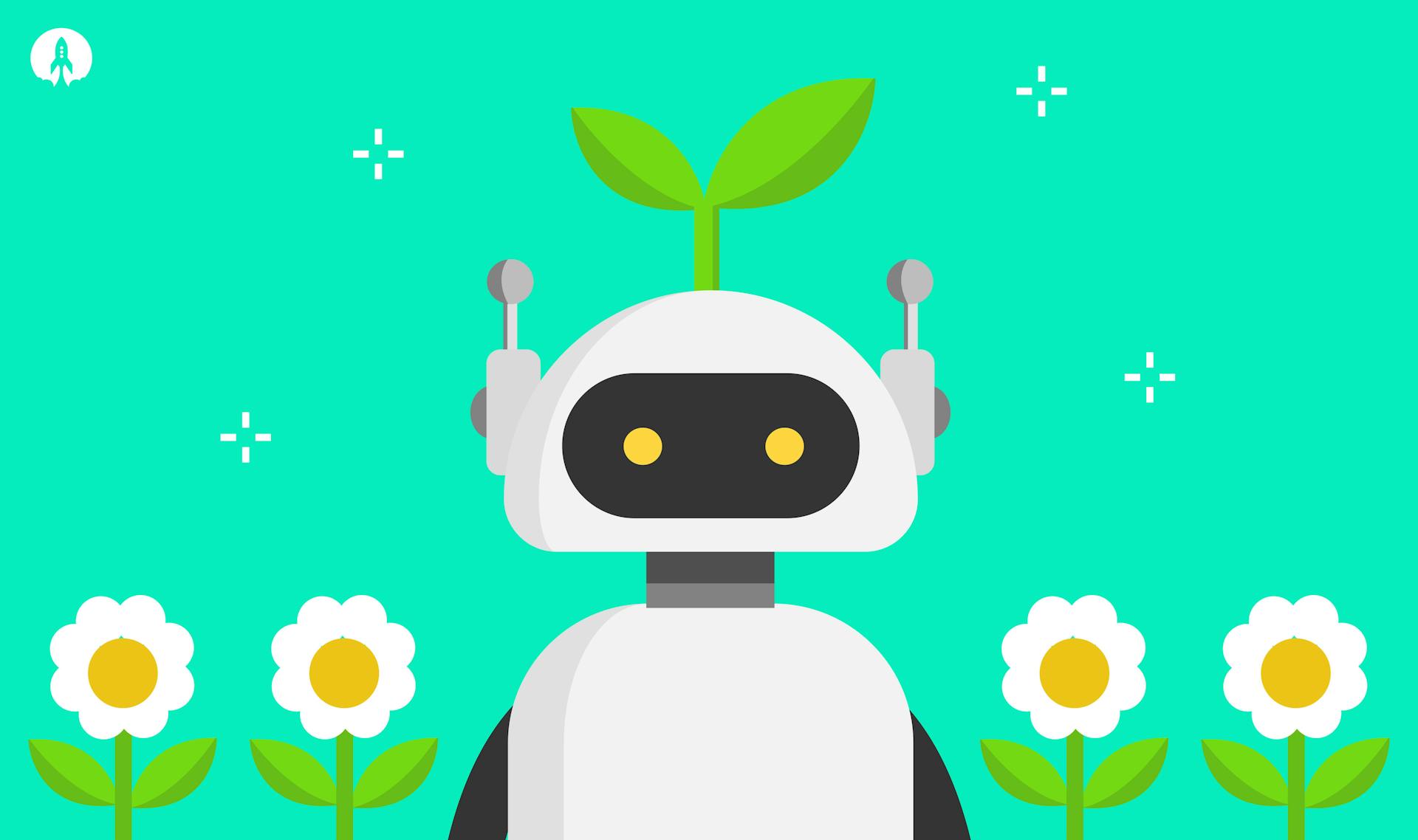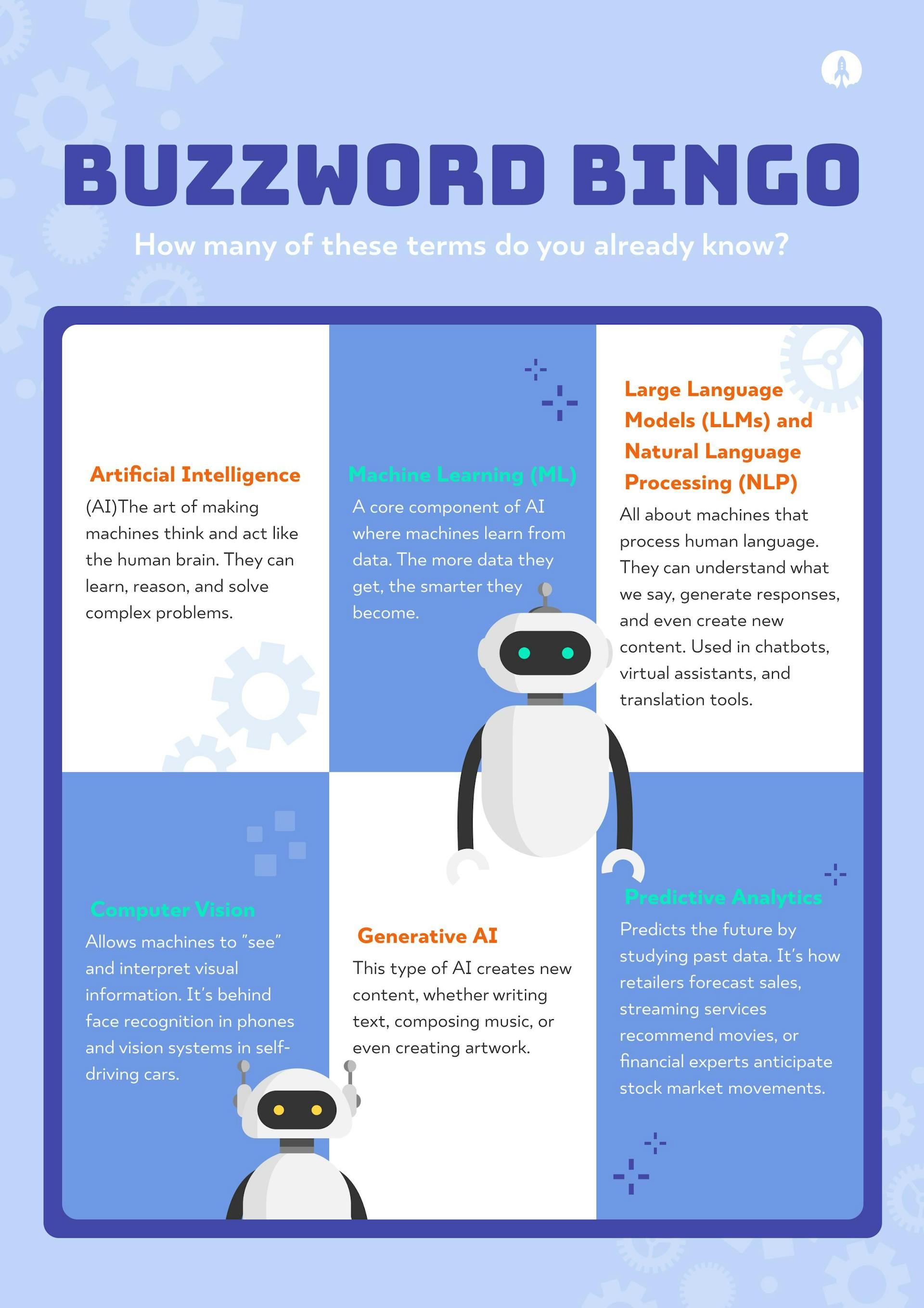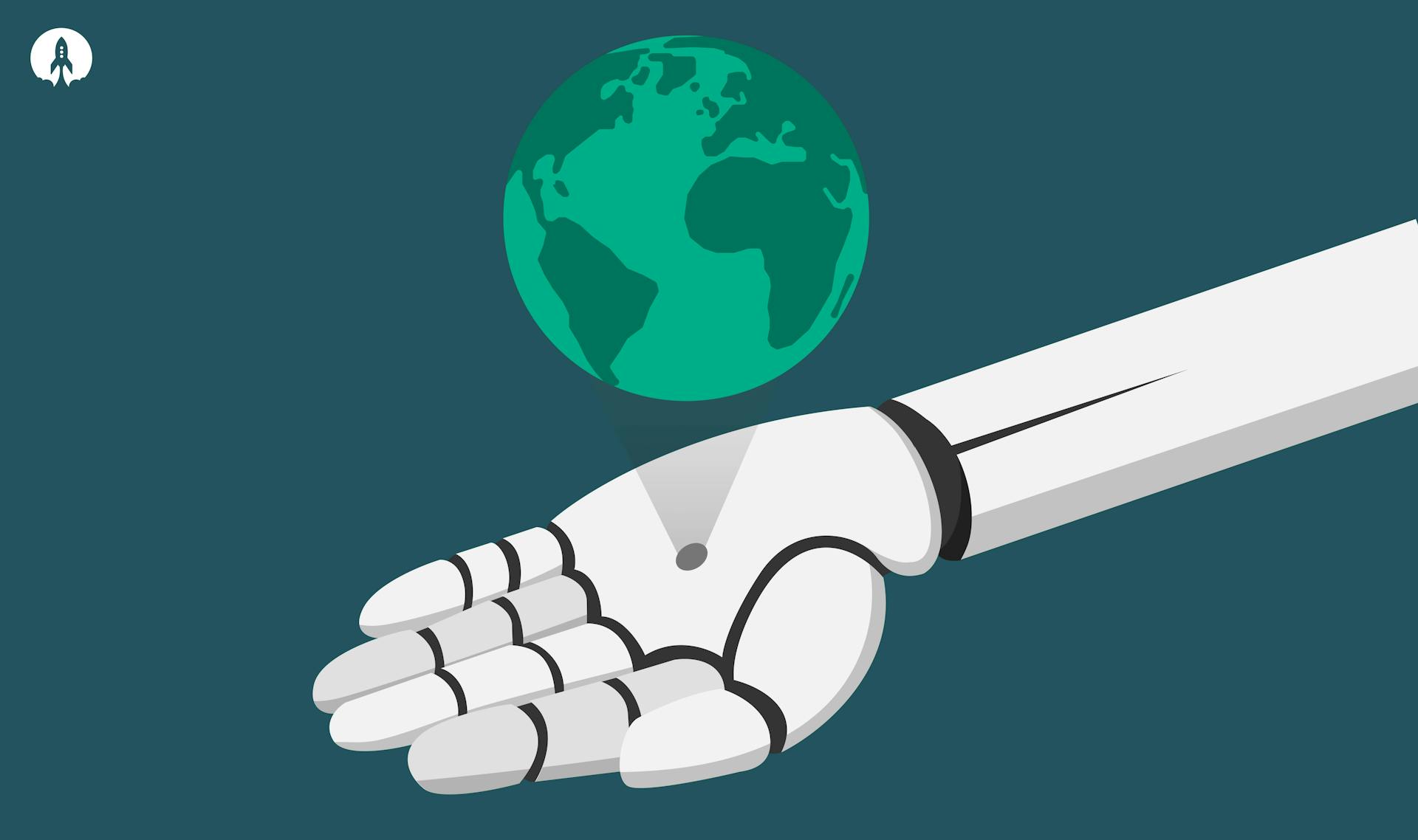How Green AI Is Shaping A Sustainable Technological Future

As the global urgency for sustainable solutions grows, the role of technology in pioneering green initiatives to reduce the impact of climate change has become critical.
At the heart of this evolution is artificial intelligence (AI), which has the potential power to supercharge green technologies.
Instead of just creating intelligent machines, the focus is on using AI's abilities to transform eco-friendly technologies.
Dive in as we explore the world of Green AI, where technology meets sustainability, offering hope for a more eco-friendly future.
What Is Artificial Intelligence?
By now, you have no doubt come across the terms “artificial intelligence (AI)” and “machine Learning (ML)” and how they are going to revolutionise the world.
But what does it mean? To help you understand the basics, let's play a round of buzzword bingo to see how many terms you already know:

Underneath all the hype, AI models have slowly been integrated into our daily lives for years - from the chatbots that guide us on websites to the recommendations on your favourite e-commerce platform.
AI is not about creating a futuristic world but enhancing our lives today. If used ethically, AI can make businesses more efficient and drive better decision-making. Critically, AI can help us mitigate the most severe consequences of the climate crisis.

In short, the clever adoption of the right AI technologies for your business will reduce time on menial tasks, releasing staff for high-value work.
ℹ️ Want to learn more about AI and how to use it in your business? Download our AI Guidebook here.
Enter Green AI
Green AI falls into the field of green technology. Green tech is a broad term for technologies designed to help protect the environment, reduce our impact on the planet, and reduce greenhouse gas emissions. Essentially, green AI refers to artificial intelligence that is environmentally friendly.
In our view, green AI has two components.
1️⃣Using AI technologies to enhance green and sustainable solutions in various fields, including energy production, waste management, conservation, and climate modelling.
2️⃣Developing and implementing artificial intelligence (AI) methods, algorithms, and systems with reduced energy consumption and environmental impact.
With the rising climate change and pollution concerns, merging AI with green tech is a promising way forward.

How Green AI Will Make a Difference
Green tech's ultimate goal is to reduce human activities' environmental footprint, and it has the potential to accelerate our progress significantly.
Integrating AI into green technology can make a substantial difference in various ways by improving sustainable initiatives' efficiency, scale, and scope. Below, we’ll explore how AI can improve green technology.
♻️Energy Efficiency
Smart grids: AI can help to optimise energy distribution in smart grids, which ensures that energy is used efficiently and energy consumption is reduced.
Demand prediction: AI can forecast energy needs, which allows for better resource allocation.
Building management: AI can analyse the data from building sensors to optimise heating, lighting, and cooling systems, which ensures maximum energy efficiency.
♻️Renewable Energy
Predictive maintenance: Predictive AI-powered analytics can forecast when green technology equipment will need repairs, thereby minimising downtimes and increasing overall productivity.
Optimisation of energy harvesting: By analysing weather data, AI can help optimise the angle of solar panels or the operation of wind turbines to capture the most energy.
Energy storage: AI helps optimise battery storage systems by determining the best times to store or release energy.
♻️Environmental Monitoring
Air and water quality: AI can analyse data from various sensors to monitor air and water quality, and help to predict potential pollution events, which ensure timely interventions.
Biodiversity monitoring: AI tools, often coupled with drones or automated cameras, help monitor wildlife, track migration patterns, and detect illegal poaching or deforestation activities.
♻️Waste Management
Recycling automation: Robots with AI vision systems can identify and sort recyclables more efficiently than human sorters.
Waste reduction: AI can predict waste generation patterns and optimise waste collection routes, which will reduce the overall carbon footprint of waste management operations.
♻️Transportation
Optimised traffic flow: AI can analyse traffic patterns to optimise traffic light timings, reduce congestion, and suggest alternative routes.
Electric vehicles (EV): Similar to smart grids, AI can help optimise battery usage in EVs, predict maintenance needs, and even determine efficient charging times and locations.
♻️Climate Modeling
Prediction and simulation: Advanced AI models can help scientists make more accurate predictions about climate change and its impact. These insights are crucial for policy-making and implementing proactive measures.
♻️Agriculture
Precision agriculture: Data analysis from satellites, drones, and ground sensors could monitor soil health, predict diseases, optimise water usage, and improve crop yields while reducing resource use.
Supply chain optimisation: AI could reduce waste and improve resource efficiency by tracking and optimising food supply chains.
♻️Supply Chain and Manufacturing
Optimised logistics: AI can help companies optimise their supply chains to reduce emissions.
Material usage: Product design using AI could create products that use fewer raw materials or are more easily recyclable.
♻️Consumer Behavior
Energy monitoring: Home assistants can monitor and advise on energy use, which will help consumers save electricity and reduce their carbon footprint.
Personalised recommendations: AI can suggest green products or sustainable practices based on individual consumer behaviour.

While our brains are powerful, they have limits in finding patterns from big data sets. AI, with its advanced algorithms, can do this very easily.
By understanding the patterns and their implications, an AI model - especially deep learning networks - can be trained on historical data to predict future outcomes. The result is a powerful tool for making informed decisions.
For businesses, this is invaluable. Making decisions becomes about anticipating the next move, not just reacting to the current situation. It's a significant shift, paving the way for smarter strategies and better risk management.
Software Opportunities in Green Technology
AI presents a huge opportunity for enterprises and startups to create innovative software solutions in green technology.
🌿Data analytics and AI platforms: Harnessing renewable energy and optimising waste management require advanced analytical tools. AI-driven platforms can predict energy consumption patterns, detect inefficiencies, and optimise green tech solutions in real-time.
🌿Blockchain: Whether it's tracing the source of sustainable materials or verifying carbon credits, blockchain can provide transparent and tamper-proof solutions.
🌿Digital marketplaces: Platforms that connect consumers to sustainable products, or businesses to renewable energy solutions, can propel the green economy forwards.
🌿Remote monitoring: This is especially relevant for large installations like solar farms or wind turbine fields, as it allows operators to manage and troubleshoot systems from a distance.
🌿Sustainability apps: Empower individuals to monitor and reduce their carbon footprint, manage their energy consumption, or even engage in community-based sustainability projects.

Potential Downsides and Environmental Impact of AI
The use cases for green AI hold immense promise. But it also presents specific challenges.
When it comes to green AI, we see two main pitfalls. They can be grouped into environmental concerns and ethical concerns. We’ll discuss these in more detail below.
Environmental concerns
Energy consumption
At its core, green AI is all about sustainability. The big elephant in the room is that a large amount of energy and computational cost are required to train machine learning models, factors which raise concerns about its carbon footprint.
AI models are powered by networks of servers in data centres all over the world. This processing and data storage require vast energy and water to keep cool. A lot of this electricity may come from non-renewable resources, which would lead to increased carbon emissions.
Companies such as OpenAI do not reveal the processing costs of their newest models like GPT 4, which makes it difficult to determine the associated carbon emissions. However, a 2021 study indicated that ChatGPT used as much energy annually as 120 households.
Some estimates state that training a single large transformer model from scratch could use around 300 tons of CO2 - which is a lot of greenhouse gas emissions!
As of 2023, the AI community has a prevailing "bigger is better" mindset. Coupled with the expected 40% annual growth of the global AI market, this could lead to soaring emissions.

When businesses begin to incorporate AI tools, it's not just about the tool's direct capabilities but also the environmental footprint of its creation and operation. This involves taking a deeper dive than just looking at the surface-level utility of the tool; companies should probe into the origins of the tool, how it's made, and how its data is stored and processed.
But here's the crux: environmentally conscious practices often align with efficiency. By opting for AI tools developed in energy-efficient data centers, or those with a clear record of their energy consumption, businesses are contributing positively to the environment and making savvy business decisions. Efficiency in resource use, after all, often translates to cost savings.
So, it's a dual mandate. Ensure that the AI tools and their developers follow eco-friendly practices, not just for the planet's sake but also because it simply makes good business sense.
Hardware demands
As we mentioned above, data collection and storage have high energy consumption. These vast server farms require a lot of infrastructure. The hardware needs to be continuously upgraded to support the ever-increasing data, which leads to increased electronic waste.
The need for more hardware means more resources must be extracted.
⚠️Ethical Concerns in AI's Integration with Green Technology
❎Bias in energy allocation: AI models used for energy distribution might perpetuate historical biases by potentially prioritising areas with historically higher consumption and neglecting underserved regions.
❎Privacy in environmental monitoring: While AI can help track environmental variables, it might also inadvertently monitor private properties or individuals, which creates privacy concerns.
❎Security of green infrastructure: AI systems integrated with renewable energy grids or other green infrastructures can be vulnerable to cyberattacks, which could potentially disrupt essential services.
❎Consent in environmental data collection: Drones or sensors powered by AI for environmental monitoring might collect data without the explicit consent of individuals or communities in the monitored area.
❎Job displacement in green sectors: As AI streamlines processes in renewable energy sectors or waste management, the potential for job losses increases, which would lead to economic and social concerns.
❎Accountability in automated green solutions: Determining responsibility can be complex should an AI-driven environmental solution fail or cause harm. It would raise questions about whether the blame lies with the developers, users, deploying companies, or the technology itself.

At Rocketmakers, as a proud B Corp, we focus on people and the planet. Regarding AI, we adopt a holistic approach with our partners. Together, we evaluate if AI would be a good fit and strive to select the most sustainable option for your product
Final Thoughts
Sustainability has shifted from a nice to have to an absolute necessity. This shift opens exciting opportunities for businesses to dive into the green tech space.
Green AI has emerged as a beacon of hope at this critical moment. This technology has the potential to boost economic growth while simultaneously reducing emissions.
AI can transform industries by promoting efficiency and minimising waste. However, for this to work, AI itself has to go green.
👋Rocketmakers: Experts in Green Tech and AI
Ready to embark on an AI software venture? At Rocketmakers, we’re experts in green tech and AI. And as a B Corp, one of our primary aims is to create software solutions that positively impact the people and the planet, so we are passionate about working on projects within this space.
Whether you envision a sophisticated AI tool for renewable energy or a user-centric app that promotes sustainability, our expert team is equipped to turn your vision into a reality.
Connect with us, and let's shape a sustainable future, one line of code at a time!



